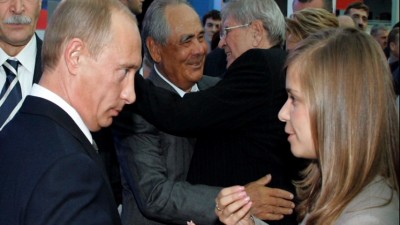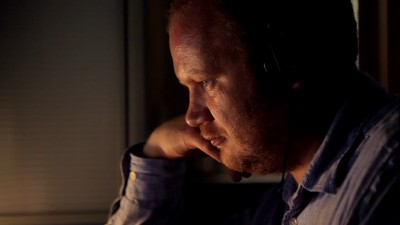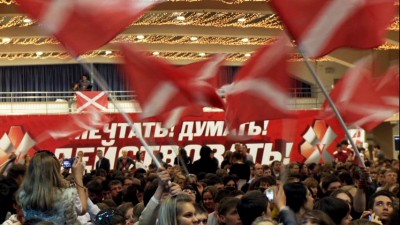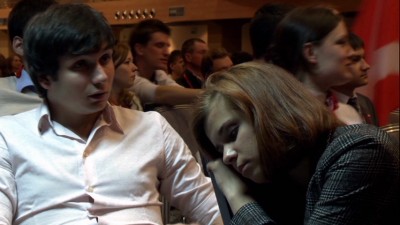| Reviews & Columns |
|
Reviews DVD TV on DVD Blu-ray 4K UHD International DVDs In Theaters Reviews by Studio Video Games Features Collector Series DVDs Easter Egg Database Interviews DVD Talk Radio Feature Articles Columns Anime Talk DVD Savant Horror DVDs The M.O.D. Squad Art House HD Talk Silent DVD
|
DVD Talk Forum |
|
|
| Resources |
|
DVD Price Search Customer Service #'s RCE Info Links |
|
Columns
|
|
|
Putin's Kiss

Masha Drokova, a hugely successful Russian TV journalist and the "star" of Lise Birk Pedersen's documentary Putin's Kiss, was born in 1989, the year the Berlin Wall fell and Soviet communism began its quick and irreversible crumble. She's one of the most prominent success stories from the first generation of Russian youth to never have known Cold War-era privations -- an educated, pretty, well-dressed exemplar of the New Russia and its prosperous middle class. This, along with Drokova's air of ambitious but wide-eyed innocence, makes her the perfect symbolic figure for Pedersen's investigation into what turns out to be the very compromised soul of the shiny new Russia long presided over by the charismatic, nationalist/authoritarian rabble-rouser Vladimir Putin, with whose rise to power and popularity Drokova's own brilliant, prodigious career is inextricably bound. Drokova's life story, as Pedersen tells it, is nothing less than the textbook fulfillment of post-Soviet dreams of "success" -- affluent, English-speaking, bright-side-looking, Western-style success -- but also, with its hidden complications, sacrifices, and betrayals, the potentially fascist price that the Russian people, its youth in particular, are being asked to pay for a sense, real/well-founded or not, of social mobility, rosy futures, and national pride.

The kiss referred to in the film's title was just a formal peck, but a name-making honor for Drokova nevertheless; we glimpse it in a widely-seen snapshot (part of Pedersen's well-researched and -assembled gallery, drawn on intermittently throughout the film, of still-photo and broadcast archival material involving this precocious young woman) from a 2007 meet and greet with Putin attended by Drokova in her capacity as a high-up emissary of "Nashi," a very popular sort of Putin-Youth organization. Her moment with Putin was the watershed culmination of a years-long, hardworking rise through the ranks of Nashi, and Drokova subsequently became not only one its most visible and popular leaders -- part of the inner circle of Vasily Yakemenko, the organization's Putin-connected, celebrity-status Svengali -- but, even though still only a teenager, a privileged personality (she was admitted to an elitte Russian University in addition to her other high-profile honors), sought-after TV talk-show guest, and "journalistic" interviewer and presenter on a channel that is, from the looks of it, Russia's own right-wing panel-show answer to Fox News.

The story that Pedersen cross-cuts with her archival and newly-taken footage of the sweet-natured but driven Masha Drokova gives the inevitable lie to the frantically chipper, aggressively optimistic message of personal discipline and unquestioningly pro-Putin nationalism we see, in several eerie scenes, being disseminated at rallies to vast crowds of teenagers through the well-funded and sleekly designed publicity machinery of Nashi. Drokova's personal friend but ideologically opposite number, writer and political blogger Oleg Kashin, describes the state of his country and his own experiences as a dissenting citizen, which make for an unmistakable dark, sinister parallel to Drokova's rise to the top; if one happens to be insufficiently "patriotic" or too skeptical of Putin's godlikeness, there's a whole shadow contingent of Nashi that, though quite unlike the athletic, smiling go-getters seen in their propaganda, reveals what's in the group's soul -- a militant, violent, smear-tactic-indulging faction perfectly capable of defecating on an opposition leader's vehicle, literally throwing trash on those on their "enemies" list, slandering publicly and with impunity the good names of anti-Putin intellectuals and public figures (one rally captured by Pedersen comes perilously close to out-and-out effigy-burning), or, as happened to Kashin, beat up an "enemy" journalist so savagely he was hospitalized and may never fully recover from his injuries.

It's this potential eye-opener for the sheltered Drokova as to the dark (or true) side of her beloved Nashi that provides the film's core of dramatic tension, out of which Pedersen spins a fairly wide-ranging look at a deeply troubled, conflicted, frightened, vulnerable, and often dangerous Russian society riven by political fractures that are marked by violent animosity and topped off with the pro-Putin agitators' flirtations with everything's-fine, no-questions-allowed intimidation tactics -- i.e., fascism. Will the exposure of the well-meaning but undeniably sheltered and somewhat shallow Drokova to her own ideology in action effect any change in attitude on her part? The open channels between her and Kashin as they remain friendly even through serious debate/disagreement, Drokova's stubborn insistence on Putin's saintliness and Kashin's scathing criticisms of the president, is a bright spot, and the extent to which the sympathetic Masha is willing to cross that bridge toward her friend Oleg as his awful experience sheds some light on Nashi's dark heart is moving; one may rightly see her as a mere pawn in Putin's cynical political game, but her sincerity rarely seems in doubt, and the sacrifices she's willing to make when faced with suspicions about the machine she herself rode to success are surprising and touching. Still, a devastating final scene in which she and the bruised and debilitated Kashin meet for a drink, with Drokova still equivocating and defending Putin and Nashi even as she offers sympathy to her battered friend, show that the depths of devotion to leaders and organizations who reach us at a formative moment, reassure us in some profound way, or tell us what we want to hear even though we know it's dubious may well be unfathomable.

Putin's Kiss is a remarkably entertaining and fascinating film, put together by Pedersen with a news-segment producer's expertise, but it doesn't entirely hold up to scrutiny. In its eagerness for forward propulsion and neat overlaps and point-making, it skimps on some very relevant matters, such as Drokova's true feelings about and history with Nashi (why, really, was it so appealing to her and so many of her peers? The film's answers are vague, simplistic, and/or incomplete) or actual, non-anecdotal information about Russia's politics and culture, into which one might assume there would be more insight than Pedersen offers, which too often seems so fearful of being "dry" for even a moment that the film seems to be missing some necessary context or insight. More damagingly, its slick style veers off into glibness; Pedersen is much too fond of a portentous stop-frame and slow zoom in effect (accompanied by a cheesy "booming" sound effect like those that assault us from action movie trailers, no less) as an (over)emphasizing device, and her obvious playing fast and loose with the chronology and veracity of events leaves long stretches of the film feeling superficial, inauthentic (some of the film's moments seem contrived, perhaps even re-staged, for her camera, as if those surrounding Drokova and Kashin are speaking expository dialogue for us; and her opening up the film with surveillance footage of Kashin's beating, then waiting until an hour into it to explain that harsh and startling violence, seems a bit exploitative). Still, Drokova's and Kashin's stories and what we can learn from them are rich, complex, and revealing enough that they overspill the too-convenient, over-generalizing template Pedersen sometimes seems determined to impose on them. At its most incisive and scary moments, Putin's Kiss is galvanizing, alarmingly relevant to anyone, whether Russian or French or American, who passively assumes they live in a "free" country; it reminds us of the blind spots and dangers that come along with, and the diligence and vigilance required by, living in an ostensibly democratic society, where power-hungry charisma and jingoistic repression can so easily disguise themselves and gain footholds under the cloak of feel-good patriotism or forward-looking positivity.

Video:
The anamorphic-widescreen transfer of the film, preserving its original aspect ratio of 1.85:1, does fairly nicely by the film's various videotape textures (from blurry surveillance cam to TV news footage to high-def DV), with no distracting compression artifacting save for some edge enhancement/haloing here and there.
Sound:The disc's Dolby Digital 2.0 stereo soundtrack (in Russian with non-optional English subtitles) delivers the film's sound perfectly, from the score by Tobias Hylander to the spoken dimensions of the interviews, all resonating through the speakers without any distortion or imbalance.
Extras:Just the film's theatrical trailer and a stills gallery.

A sometimes tabloid-like exposé of the ongoing struggle for the soul of post-communist Russia, Putin's Kiss is a very involving and very scary mini-primer on that country's flirtations with rabid neo-nationalism and authoritarian repression, which extend their tentacles into the lives of the film's central characters: On the one hand, there's a prodigious, fantastically successful young right-wing TV journalist, Masha Drokova, and her long-running involvement with a huge, jingoistic patriotic-youth program called Nashi; and on the other, Oleg Kashin, an outspokenly skeptical blogger, opposed to Putin's reign, beaten savagely by a gang he's convinced is part of Nashi's violent "shadow side." In a way, the film is simply the story of the good-hearted but frighteningly naïve Masha's emergence from slavish devotion to Nashi into something like the first stirrings of consciousness, conscience, and enlightenment, but its reach extends much further out into Russian politics, society, and culture -- so far, in fact, that it sometimes exceeds director Lise Birk Pedersen's grasp, with the film becoming something of a too-wide snapshot teeming with more detail than needed focus (a condition not helped by Pedersen's intermittent indulgences in editing gimmicks and over-manipulation of the material to boost the drama). Still, it's a worthwhile, troubling glimpse of what's become of Russia's democratic-capitalist dreams after communism, raising the disturbing question of whether the Russian people were truly set on the path to liberation after the Berlin Wall fell, or merely released unprepared into a wilderness roamed by cryptofascist wolves like Putin and his nationalists, waiting to exploit and re-enslave them, this time to "patriotism" instead of communism. Recommended.
|
| Popular Reviews |
| Sponsored Links |
|
|
| Sponsored Links |
|
|
| Release List | Reviews | Shop | Newsletter | Forum | DVD Giveaways | Blu-Ray | Advertise |
|
Copyright 2024 DVDTalk.com All Rights Reserved. Legal Info, Privacy Policy, Terms of Use,
Manage Preferences,
Your Privacy Choices | |||||||















